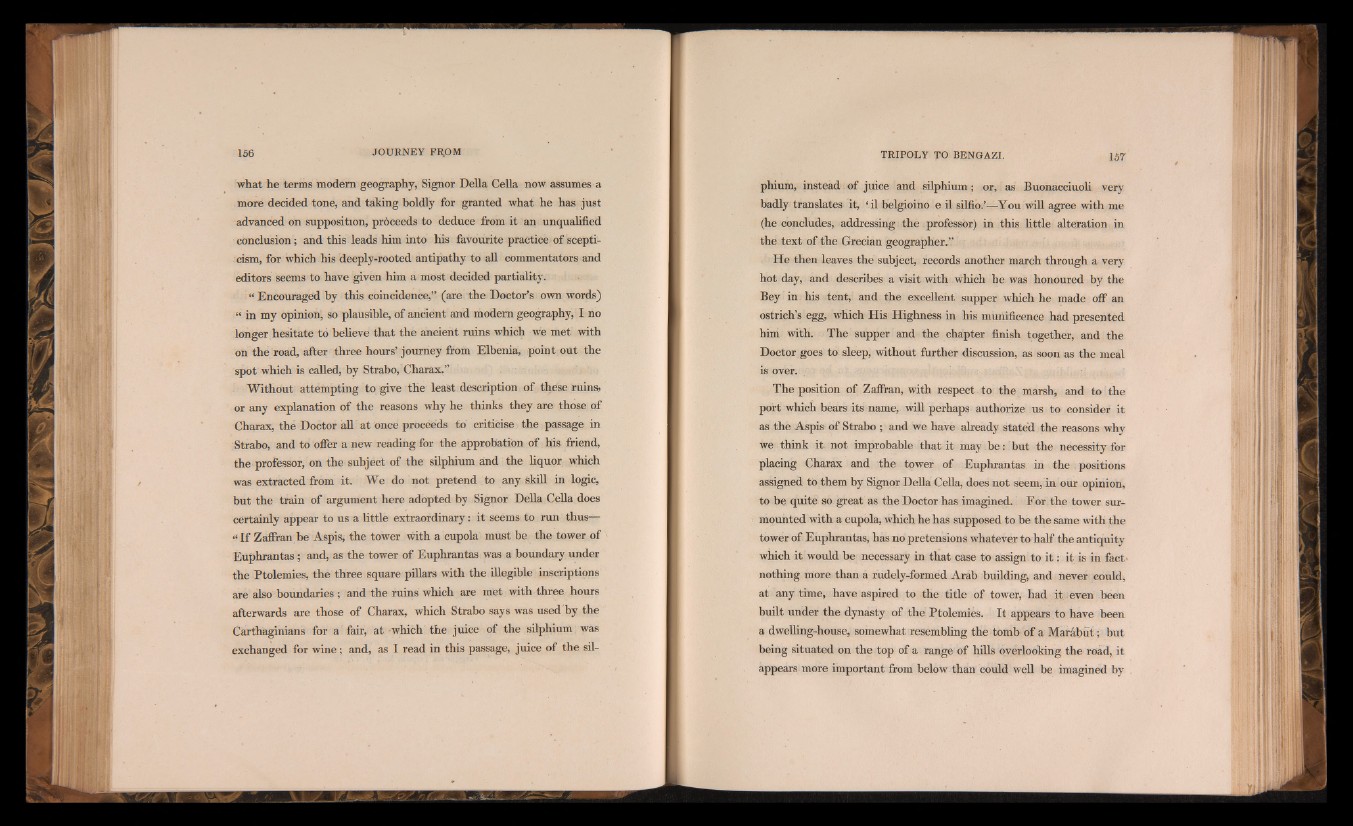
what he terms modem geography, Signor Della Celia now assumes a
more decided tone, and taking boldly for granted what he has just
advanced on supposition, proceeds to deduce from it an unqualified
conclusion; and this leads him into his favourite practice of scepticism,
for which his deeply-rooted antipathy to all commentators and
editors seems to have given him a most decided partiality.
“ Encouraged by this coincidence,” (are the Doctor's own words)
“ in my opinion, so plausible, of ancient and modern geography,:! no
longer hesitate to believe that the ancient ruins which we met with
on the road, after three hours’journey from Elbenia, point out the
spot which is called, by Strabo, Charax.”
Without attempting to give the least description of these ruins,
or any explanation of the reasons why he thinks they are those of
Charax, the Doctor all at once proceeds to criticise the passage in
Strabo, and to offer a new reading for the approbation of his friend,
the professor, on the subject of the silphium and the liquor which
was extracted from it. We do not pretend to any skill in logic,
but the train of argument here adopted by Signor Della Celia does
certainly appear to us a little extraordinary: it seems to run thus—
“ If Zaffran be Aspis, the tower with a cupola must be the tower of
Euphrantas; and, as the tower of Euphrantas was a boundary under
the Ptolemies, the three square pillars with the illegible inscriptions
are also boundaries ; and the ruins which are met with three hours
afterwards are those of Charax, which Strabo says was used'by the
Carthaginians for a fair, at which the juice of the silphium was
exchanged for wine; and, as I read in this passage, juice of the silphium,
instead of juice and silphium; or, as Buonacciuoli very
badly translates it, ‘il belgioino e il silfio.’—You will agree with me
(he concludes, addressing the professor) in this little alteration in
the text of the Grecian geographer.”
He then leaves the subject, records another march through a very
hot day, and describes a visit with which he was honoured by the
Bey in his tent, and the excellent supper which he made off an
ostrich’s egg, which His Highness in his munificence had presented
him with. The supper and the chapter finish together, and the
Doctor goes to sleep, without further discussion, as soon as the meal
is over. ,
The position of Zaffran, with respect to the marsh, and to the
port which bears its name, will perhaps authorize us to consider it
as the Aspis of Strabo ; and we have already stated the reasons why
we think it not improbable that it may be: but the necessity for
placing Charax and the tower of Euphrantas in the positions
assigned to them by Signor Della Celia, does not seem, in our opinion,
to be quite so great as the Doctor has imagined. For the tower surmounted
with a cupola, which he has supposed to be the same with the
tower of Euphrantas, has no pretensions whatever to half the antiquity
which it would be necessary in that case to assign'to i t : it is in fact'
nothing more than a rudely-formed Arab building, and never could,
at any time, have aspired to the title of tower, had it even been
built under the dynasty of the Ptolemies. It appears to have been
a dwelling-house, somewhat resembling the tomb of a Marábut; but
being situated on the top of a range of hills overlooking the road, it
appears more important from below than could well be imagined by